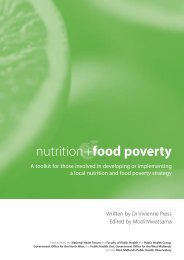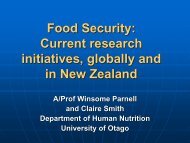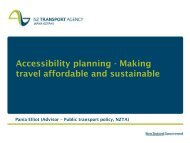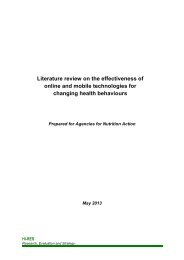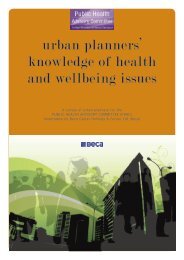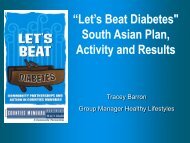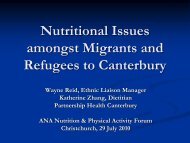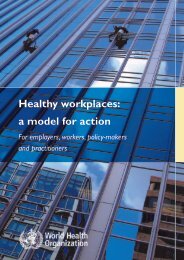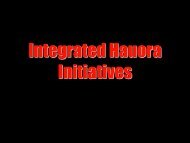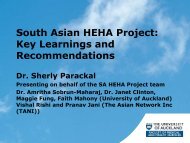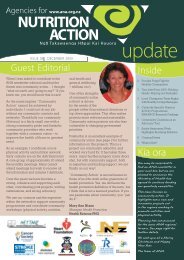enhancing food security and physical activity for maori, pacific and ...
enhancing food security and physical activity for maori, pacific and ...
enhancing food security and physical activity for maori, pacific and ...
- No tags were found...
Create successful ePaper yourself
Turn your PDF publications into a flip-book with our unique Google optimized e-Paper software.
Enhancing Food Security <strong>and</strong> Physical Activity <strong>for</strong> Māori, Pacific <strong>and</strong> Low-income Peoplesdevelopment of strategies that are more successful <strong>and</strong> are cost-effective. An importantpoint of difference of this model is that it is stage based <strong>and</strong> relies on communityin<strong>for</strong>mation to identify readiness to address a health issue (such as HIV/AIDS). Theimplementation process <strong>and</strong> level of capacity building differ according to each stage.Three case studies were presented which demonstrated the effectiveness of the model.The second paper 7 outlined the use of a conceptual model <strong>for</strong> culturally-appropriate HIVprevention capacity building among Asian Pacific Isl<strong>and</strong>er (API) providers in southernCali<strong>for</strong>nia. The three-year programme provided by an Asian Pacific AIDS InterventionTeam to API providers included the following strategies. One was technical assistance inorganisational stability/viability: one-on-one contacts/organisational ‘coaching’ (at leastonce per quarter with API staff) <strong>and</strong> workshops (about one per month on topics such asboard development, project management, collaboration, needs assessments/research<strong>and</strong> strategic planning). These provided strategies <strong>and</strong> skills <strong>for</strong> <strong>enhancing</strong> stability <strong>and</strong>viability. Also, two symposia, which led to further meetings between participatingorganisations <strong>and</strong> other agencies, thereby increasing potential partnerships. Thesecond was technical assistance on HIV knowledge environments: workshops on HIVprevention <strong>and</strong> diverse populations, knowledge about cultural norms <strong>and</strong> obstacles toHIV prevention; <strong>and</strong> programme meetings held once per quarter at the differentorganisational partner sites.The effectiveness of the programme was assessed via an organisational survey <strong>and</strong>staff observations. The organisations were mostly small, targeted diverse populations,served a large geographic area, <strong>and</strong> were knowledgeable about HIV. Organisationsbecame more viable (more capacity in human resources, financial, external relations,<strong>and</strong> strategic management), but also more unstable (large growth in paid staff <strong>and</strong> boardmembers), <strong>and</strong> showed more capacity in HIV knowledge environments. The resultssuggest that capacity can exp<strong>and</strong> over a short period of time, but as capacity increases,organisational viability/stability <strong>and</strong> HIV knowledge environments change, meaning thatdifferent types of technical assistance would be needed <strong>for</strong> sustainability. 7Feasibility (level of evidence of effectiveness)The international research into research <strong>and</strong> work<strong>for</strong>ce capacity building is encouraging<strong>and</strong> highlights the development <strong>and</strong> implementation of conceptual <strong>and</strong> theoreticalframeworks. These models have been implemented in a variety of settings <strong>and</strong> withindigenous people <strong>and</strong> minority groups. Very few evaluations of the effectiveness ofcapacity building approaches have been conducted. Of these, surveying workers hasbeen the preferred method. Generally, there was sufficient evidence to support thedevelopment of capacity; however, more robust evaluation is required with quantitativedata to support the effectiveness of capacity building initiatives. There is no reason tobelieve that the components of work<strong>for</strong>ce development cannot be applied in the NZenvironment to develop capacity <strong>for</strong> culturally-specific <strong>physical</strong> <strong>activity</strong> programmes.SustainabilitySustainability is important; however, few high quality evaluations have been conductedto provide data on this issue. From the limited knowledge available there is a need toprovide ongoing support in the <strong>for</strong>m of education <strong>and</strong> training, mentoring, advice etc, aswell as adequate <strong>and</strong> sustained funding to ensure ongoing development of capacity.More research is required to determine the sustainability of capacity building. One of thecapacity building initiatives 7 was implemented over three years, providing some support155



